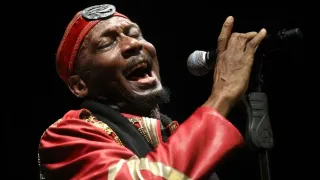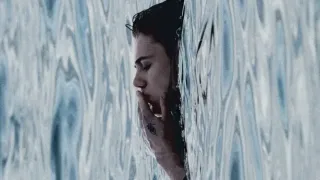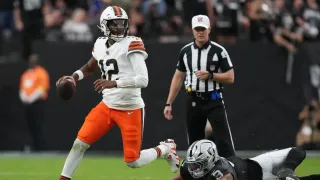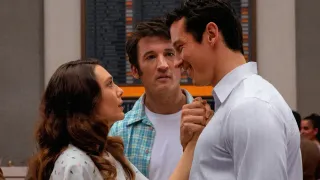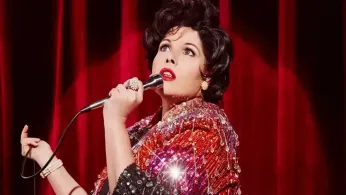
3 hours ago
EDGE Interview: Debbie Wileman On Judy Garland’s Spirit And A Christmas Album Born From Love And Legacy
Steve Duffy READ TIME: 2 MIN.
Beloved singer and Judy Garland impersonator Debbie Wileman is ringing in the holiday season with A Christmas Garland, a sparkling new album that imagines the Christmas record Judy herself never got to make. Mixing nostalgia, warmth, and Wileman’s uncanny embodiment of Garland’s voice and heart, the album blends classic and contemporary Christmas songs with glamorous orchestral arrangements; all delivered through the unmistakable lens of one of Hollywood’s most enduring icons.
“It’s always been surprising, and a little disappointing, that Judy never recorded a full Christmas album,” says Wileman. “Creating this record was my chance to imagine what it might have sounded like, and to bring Judy’s magic to some of the more modern Christmas favorites she never had the chance to sing.”
Produced by Scott Stander with orchestrations by Steve Orich (the arranger behind Broadway's Jersey Boys album) A Christmas Garland offers a joyful and poignant mix of songs, from timeless standards like “I’ll Be Home for Christmas” and “Santa Claus is Coming to Town” to modern classics like Mariah Carey’s “All I Want for Christmas Is You” and Wham!’s “Last Christmas,” reimagined through Garland’s style. The album also includes a touching duet of “Little Drummer Boy – Peace on Earth” with rock and roll icon Pat Boone and Judy’s definitive holiday staple, “Have Yourself a Merry Little Christmas,” performed with Oscar-winning actress Margaret O’Brien, who originally sang the song with Garland in Meet Me in St. Louis. “Having Margaret on this album is such a thrill,” says Wileman. “She’s a true Hollywood legend and a lovely lady to boot.” Another highlight is “After the Holidays,” a poignant song written by John Meyer for Judy Garland that she performed on The Tonight Show but was never officially recorded — until now. Wileman, who befriended Meyer before his passing, also includes another of his rarely heard works, “When Do the Words Come True” on the album. “John told me he wrote it on the day of Judy’s funeral,” she shares. “He said it was everything he thought she felt. Recording it was my way of honoring him and Judy both.”
As Wileman brings Judy’s timeless spirit into the present with A Christmas Garland, she sat down with us to reflect on the roots of her devotion, the craft behind her uncanny voice, and the journey that led her from childhood movie nights to international stages.
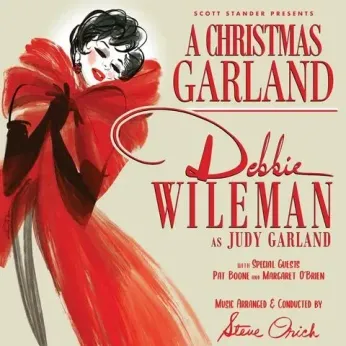
Source: Debbie Wileman
EDGE: You’ve become known worldwide for your uncanny Judy Garland impression. What inspired your love for her?
DW: I used to love watching films with my Nana—that’s what I called my grandmother. I was not only an only child, but also an only grandchild, so we were very close. One of our favorite things to do together was watch movies. I’d go over to her house, and we’d snuggle on the settee under a blanket with sweets I wasn’t allowed to have at home. We’d make a trip to Woolworths first, buying all the treats my parents wouldn’t approve of, and then settle in for a Hollywood film. My Nana was a huge fan of the Golden Age of Hollywood. She was born in the early 1920s—June 11, 1921, to be exact—almost exactly a year before Judy Garland, whose birthday was June 10, 1922. So she grew up during the era when all those great films were first hitting the cinemas, and she saw them all on the big screen. Later, she collected them on VHS. We watched Fred Astaire and Gene Kelly movies together, and when I was about six, she showed me Easter Parade because I already loved Fred. I absolutely adored it. Judy Garland struck me as extra special—not just glamorous, singing, and dancing, but funny too. I loved that about her. Because I liked her so much in that film, my Nana introduced me to all the others she had on video. That’s really what started my lifelong love of Judy Garland. My Nana was also a brilliant pianist. We’d sit at the piano together, and she’d play while I sang Judy’s songs. Those moments were magical, and they began when I was very little. That’s how my love for Judy Garland—and classic Hollywood—was born.
EDGE: When did you realize that you sound like Judy?
DW: I’ve always had a voice that sits comfortably in Judy Garland’s range, and I realized around age 12 that I could actually make myself sound like her when I sang. It started as something fun—I’d do it for my grandma just to make her laugh. I remember saying, “Hey, Nana, listen to this!” Singing was always a mood booster for me, so it was just something I discovered while singing around the house. Years later, when I was finishing my performing arts degree at university, we had the option to either write a thesis or put on a show. I thought, What would I most love to perform? The answer was Judy Garland. That way, I could sing all those incredible songs, and I already knew I could sound a bit like her. So I wrote a one-woman show about Judy Garland for my degree. That’s when I really practiced and honed my impression. After performing it at the university theater, someone saw the show and invited me to do it at a small gay bar theater in Manchester. I said, “Brilliant!” and then went on to perform it at a few other theaters. That was in my early twenties. However, eventually, I didn’t receive enough work to continue pursuing acting, and by the time I was 25, I gave up because I needed a steady income and had to secure a regular job.I didn’t do much with it after that—just for fun—until COVID hit. During lockdown, I started making little videos online and revisited my Judy Garland impression. It was like reconnecting with an old part of myself.
EDGE: During the pandemic, your “Song a Day” videos went viral. How did that experience shape your career and lead to projects like A Christmas Garland?
DW: It’s amazing to think that I, sitting in my car or in my utility room, singing into an old iPhone, has led to this. It’s incredible. I was fortunate enough to be viewed online by many people, but the real turning point was when a producer named Scott Stander—who is now my manager—came across one of my videos on Facebook. He reached out via Messenger, and we started chatting. He said, “When this is all over, I’m going to fly you to LA.” Honestly, I thought, Sure, okay… We’ll see. But he did! And from there, we began working together. He’s a wonderful person, and we’ve already done some amazing things. One of those ideas was this project. Judy Garland never released a Christmas album, and we thought it would be a truly special project to create. I’m thrilled to say—we’ve done it.
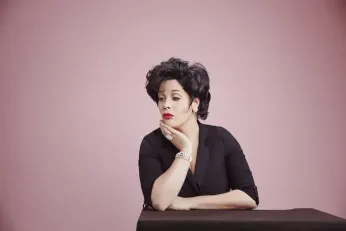
Source: Debbie Wileman
EDGE: Were there any challenges in reimagining the songs in Judy’s style?
DW: The songs we ended up recording didn’t really present major challenges—because that’s why we chose them. If something felt too difficult, I’d simply think, You know what? Let’s do something else. That said, there are still some nuances to consider. For example, phrasing can be tricky with very fast songs. And as you know—and your husband will know—Judy’s voice changed throughout her life. So when performing as Judy, you have to adjust your impression to match the era of the song. Generally, I perform as “concert years” Judy, which is where I feel most comfortable. It aligns with my own age now—I’m 41—and Judy was in her early forties during those iconic early-1960s concerts. That’s the era I usually draw from. But for certain songs, I had to shift. For instance, we recorded a version of All I Want for Christmas Is You inspired by the energy of The Joint Is Really Jumpin’ Down at Carnegie Hall. That meant imagining a younger Judy—faster phrasing, lighter tone—so I adjusted my impression accordingly. On the other hand, I was thrilled to record Till After the Holidays, the Christmas song Judy sang on The Tonight Show with Johnny Carson in 1968. That’s an older Judy voice—very different from the early-sixties concert sound—so again, I had to adapt. So yes, the challenge is always: Which Judy am I today? Matching the period of Judy Garland to the period of the song—or to the inspiration behind it—is key. For example, Hard Candy Christmas (the Dolly Parton song) reminded me of Judy’s By Myself from I Could Go On Singing. Both have that bittersweet resilience: “I’ll face it, I’ll get through it.” You wonder—does she believe it, or is she fooling herself? That’s the emotional tone I aimed for. In short, every song required me to think about Judy’s era, her vocal style at that time, and the feeling behind the music.
EDGE: How do you balance staying true to Judy’s essence while adding your own interpretation?
DW: When I perform live, I speak as myself. I try to sing as much like Judy as I can, but when it comes to talking between songs, it’s really me sharing stories about her. Occasionally, I’ll slip in a little hint of her voice for fun, but I don’t stay in character the whole time—I’m not up there saying, “Hello, I’m here from London” for the entire concert. So there’s definitely a part of me in the show. You can also see me in the choice of material. For example, I decided to include “Last Christmas” by Wham—who might not be as well-known in the States as they are in the UK—because I love George Michael. On the first album, I even chose an Amy Winehouse song, which is another very London thing. Those choices bring a bit of myself into the performance. But when it comes to the singing, I aim to sound as much like Judy as possible.
EDGE: If Liza or Lorna were to listen to your album, what would you hope they would feel or take away from it?
DW: I’m not sure if Liza is aware of me. People have told me she is, but I don’t know if they’re just being kind. I did meet Lorna very briefly—I went to see her show in London, and we took a photo together. But I completely understand that, for Judy’s children, it might feel strange to see someone impersonating their mother. It’s an unusual situation, and I’d never want them to feel uncomfortable. My hope is that they would see what I do as a loving tribute—because that’s truly what it is. I’m a huge fan of their mother, and of them as well. Everything I do comes from admiration and respect. I’d like to think they’d find it fun, and maybe even believe Judy herself would have enjoyed it. After all, Judy loved good impersonations—she even did impressions of herself! She was also a big fan of Jim Bailey, who was an incredible performer. I know this because I’ve become friendly with Jim’s former manager, Steve Campbell. He told me that Liza admired Jim Bailey so much that she gave him one of Judy’s famous rings—a beautiful piece adorned with pearls—as a gift. Judy herself also gave Jim a small bottle of her perfume, Madame Rochas, back in 1965. I hope Liza would appreciate what I do. I’d hope Lorna would like it. I’d hope Joe would like it. But I understand it’s a little unusual for them. Still, everything I do is with love and respect.
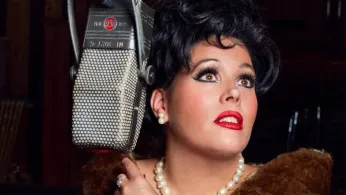
Source: Debbie Wileman
EDGE: Judy Garland is an icon in LGBTQ history. How do you contact with that legacy through your performances and music?
DW: I’ve always felt really embraced by the LGBTQ community whenever I’ve performed, which has been such a lovely experience. Back when I was at university, I did a show at a gay bar theater, and they invited me to perform at their club on Canal Street in Manchester. Everyone was so welcoming. I must have been about 20 at the time, and I’d already spent nights out in the gay village singing and socializing. It always felt like a friendly, safe place for me as a young woman. I think I share a lot of interests with the LGBTQ community—I just do. I have loads of gay friends, and honestly, I try to appeal to everyone when I’m singing, but it seems like a high percentage of LGBTQ people connect with me, which is wonderful. When I was 18 or 19, I was asked to sing for the Man Bears—a big gay bear group that hosted an annual Bear Weekend in Manchester, attracting people from all over the world. I performed at three Bear Bashes and even made a special video with them for their 10th anniversary called All That Fur, which I sang with the guys. One of my best friends came from that experience; he even traveled from North Wales to see me perform at Carnegie Hall for my Judy Garland show. I’ve always felt supported by the community, and that means a lot to me.
EDGE: You’ve performed at Carnegie Hall and toured internationally. How did it feel performing in the same place?
DW: It was amazing. I was on one of the smaller stages—there were a couple of stages I didn’t perform on—but it was still fantastic. Honestly, it felt quite daunting at first. I kept thinking, Don’t mess it up. Don’t mess it up. Oh my God. But once I got going, it was brilliant. The audience was fabulous, and the whole experience was incredible. This was when I did the Christmas show there—I’ve done it twice now. The first time was just a few days before my 40th birthday, which made it feel even more special. The very next day, after performing at Carnegie Hall for the first time, I headed to Provincetown for another show. I think I enjoyed that one even more because I wasn’t as nervous—I could finally relax and take it all in. Just being in New York is exciting for me, but singing at Carnegie Hall? That was a dream. And to make it even better, a lovely man named Joe—who collects Judy Garland memorabilia—offered to display some original Judy costumes in the foyer for the audience to see. He emailed me and said, “I have these pieces—would you like me to bring them?” I said, “Yes! If I can touch them!” He brought a nightgown Judy wore in The Harvey Girls and another piece from The Clock, which I adore. The Clock is such a romantic film.
EDGE: Which song on this album would you want to sing with Judy?
DW: Honestly, I’d rather just listen to her sing. But since Little Drummer Boy / Peace on Earth is a duet, I guess that makes sense. Still, the song I really wanted to sing was one written by John Meyer called When Do the Words Come True? It’s not actually a Christmas song, but he asked me to sing it at Christmas. That’s how I became friends with John Meyer—her ex-fiancé, the one she left to marry Mickey Deans. He reached out to me on Facebook after seeing a video of me singing. At first, I didn’t realize who he was. I’d accepted his friend request without thinking because I used to accept everyone. I was naïve. Later, he messaged me saying, “Great version of my song.” I was stunned—this was the John Meyer who wrote Heartbreaker, a book I had on my shelf! We started exchanging messages during COVID, so we couldn’t meet in person then. He even made me a piano backing track and sent it over. Eventually, we met in New York a few times for lunch. He was a wonderful guy—funny, smart, and we shared a love of dirty limericks and film history. In 2023, he was my special guest at my Christmas show at Carnegie Hall. I interviewed him on stage and even recreated Judy Garland’s “Tea for Two” segment from her TV show with him. That night, he told me about a song he wrote on the day of her funeral. He said it just flowed through him—everything he felt Judy would have said about her life. The song was called When Do the Words Come True? He performed it on stage, and it was incredible. The audience gave him a standing ovation. He told me, “Debbie, I’d like you to record that. It’s never been recorded.” I was thrilled to include it on my album. Sadly, he passed away two months later. He’d postponed a surgery for gum cancer so he could do the show. When he finally went in, the procedure was far more extensive than expected—they removed the entire roof of his mouth in what’s called a maxillectomy. He was 84. He survived the operation but couldn’t speak; we texted while he was in the hospital. Ultimately, it was too much for him, and he died there. It was heartbreaking. He was such a great man, and I’m grateful he got to feel how loved he was by the Garland community. Recording that song for him felt deeply meaningful. From our conversations, I know he was still in love with her. Singing that song feels like honoring both of them—it’s her words as he imagined them. He would have loved for her to sing it, but I’m honored to have done it.
EDGE: After A Christmas Garland, what’s next for you?
DW: I’m not sure what the future holds. I’m still a mom first—you see, life at home revolves around that. I’d love to do more concerts and tours, and I’m excited about singing as myself as well as Judy. In fact, I have a show coming up at Birdland in a couple of weeks, where I’ll perform as various characters, as well as myself. There will be a bit of Judy in there, of course, but it feels nice to include some of “me” too. Balancing everything can be tricky—my daughter’s birthday is tomorrow; she’s turning eight! So, happy birthday to her. Honestly, I’m just riding this wave of unexpected performing opportunities and saying yes to whatever comes my way. Last month, I even did my first cruise show, which was amazing. So for now, I’m taking it all as it comes and enjoying every moment.
Debbie Wileman’s A Christmas Garland is available now on all major streaming platforms

